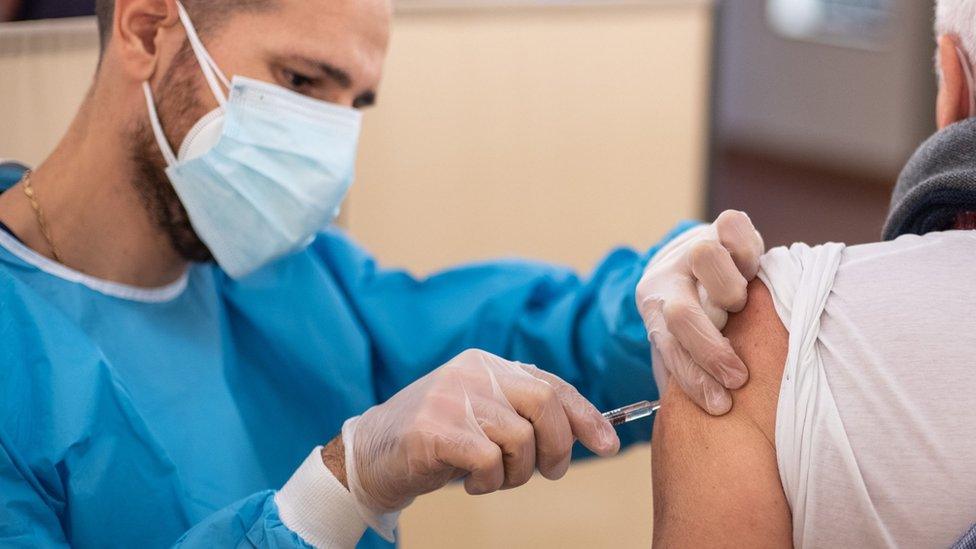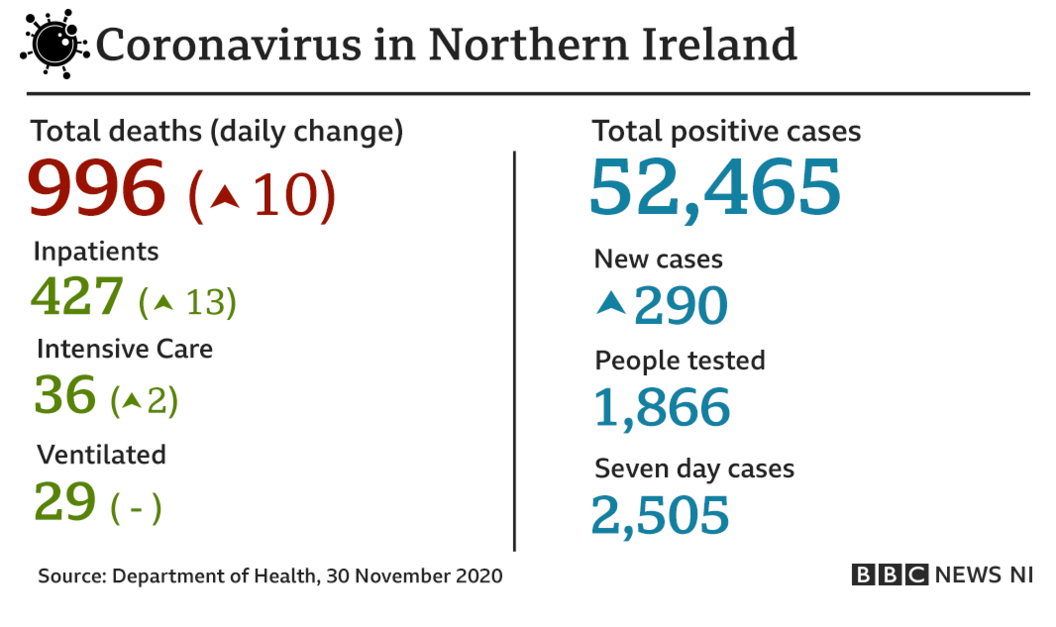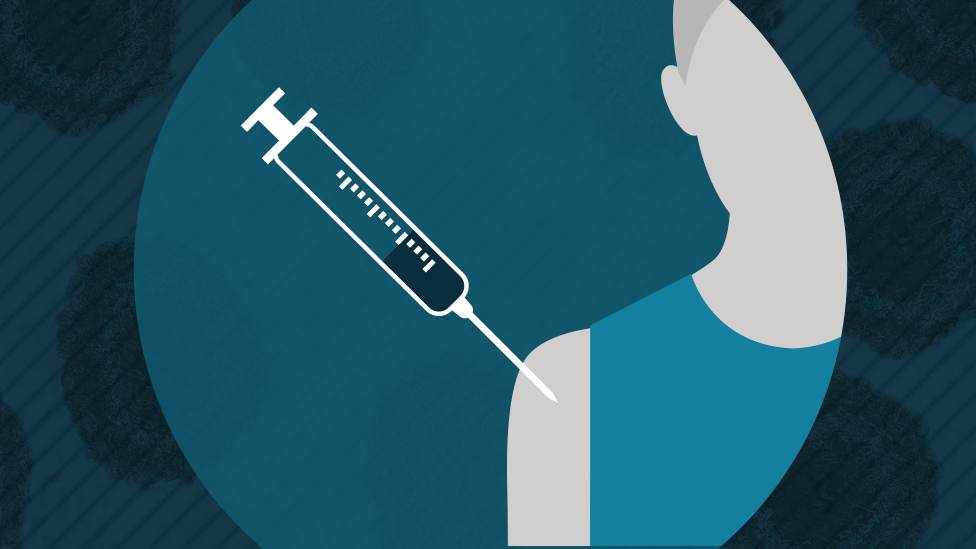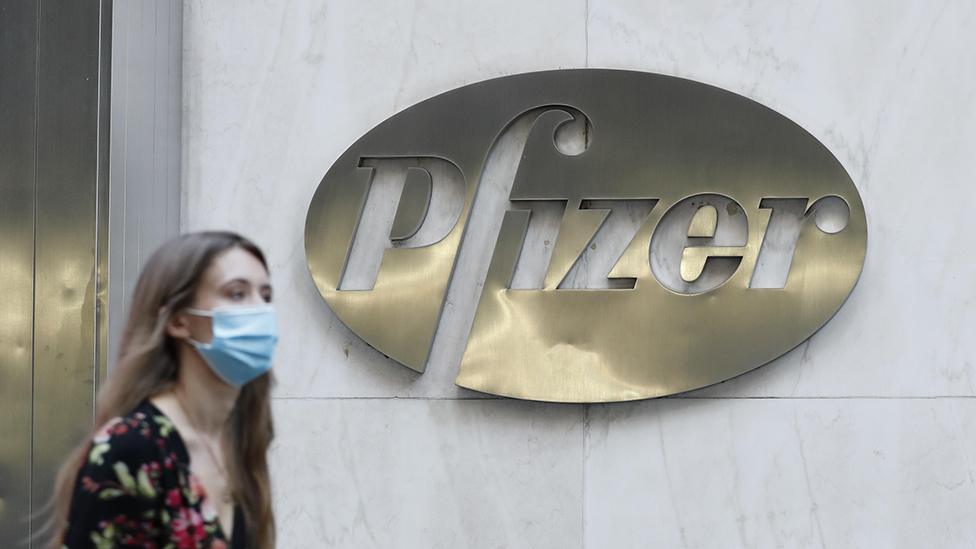Covid-19 vaccines: Belfast Trust staff 'can decide to have jab'
- Published
- comments

Two coronavirus vaccines are expected to be approved for use in Northern Ireland this week
Staff in the Belfast Health Trust are being asked whether or not they want to receive the Covid vaccine.
The BBC has seen an email and questionnaire sent to all employees telling them workers will receive the Pfizer vaccine.
Trade unions say they are encouraging front-line workers to get the vaccine but everyone should be given a choice.
Another 10 Covid-related deaths and 290 new cases were reported by Stormont's Department of Health on Monday.
It brings the department's death toll - which consists of deaths from any cause within 28 days of a positive test - to 996.
'Frankly scary but doable'
The email sent to all staff at the Belfast Trust goes on to say that further guidance will be issued in the coming days on how to book a time and venue to get the first jab.
"It is crucial we plan our clinics appropriately to ensure everyone is able to receive both vaccinations," the trust says.

Vaccinating up to 100,000 health care staff is going to be one of the biggest civilian healthcare operations that Northern Ireland has ever seen.
If the Pfizer vaccine gets the official go-ahead this week, staff could receive the first of their jabs within a fortnight.
That vaccine requires two separate injections a number of weeks apart.
Kevin McAdam, Unite's regional officer, said: "The whole concept of what we are trying to do is frankly scary, but doable. We need all shoulders to the wheel.
"I don't think it's helpful to make it mandatory for health service staff. That would not be helpful. We have always resisted that for flu vaccine."
Vaccinators required
The roll out of Northern Ireland's Covid-19 vaccination programme could begin by mid-December, BBC News NI understands.
It is widely anticipated that the regulatory body will approve two vaccines this week, which will allow the plans to become official.
A digital booking system for healthcare workers is also being set up.

The Pfizer vaccine requires two separate injections a number of weeks apart
Timings will be critical as people receiving their vaccine will have to socially distance and be monitored for 15 minutes afterwards.
This is to ensure there are no physical reactions.
Rolling out any Covid-19 vaccine is a "large logistical operational challenge," the Health Minister Robin Swann told MLAs on Monday.
"One of the biggest challenges being the AstraZeneca vaccine comes in batches of 975 vials per pack. And it will be highly challenging if not impossible to break that down into smaller packs," said Mr Swann.
"So, it is a vaccine that is designed for mass vaccination and mass vaccination centres which are going to put that initial challenge on the delivery of our vaccine programme in Northern Ireland."
Undoubtedly there remains a raft of unknowns about the rollout of the vaccines but BBC News NI understands health officials are using mid-December as a working date in their attempts to pull plans together.
Once the regulatory medicines body, the Medicines and Healthcare products Regulatory Agency (MHRA), gives the vaccines the go-ahead, a move widely anticipated to happen this week, plans around accepting, storing and delivering them will be firmed up.
It is thought Oxford's AstraZenica vaccine - the more easily stored of the two - will be used by GPs to vaccinate those aged 80 and over, while Pfizer's vaccine will be rolled out among healthcare staff and residents of care homes.
It requires much tighter controls around storage and, while healthcare staff will be required to attend the likes of leisure centres to be vaccinated, it is thought that visiting pods in care homes could be used to vaccinate residents.


By starting vaccinations mid-December, the required three-week gap means the second boost will be delivered around the first week of 2021.
In order to roll out the programme, a lot more vaccinators are required.
They will be able to administer the vaccine and may come out of medical retirement to boost numbers.
A background in healthcare, however, is not thought to be required.
It has also emerged that several doctors in Northern Ireland have taken part in the Oxford vaccine trial.
- Published15 February 2022

- Published20 January 2021
